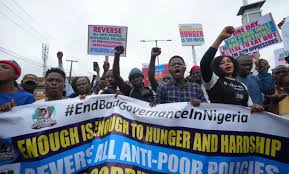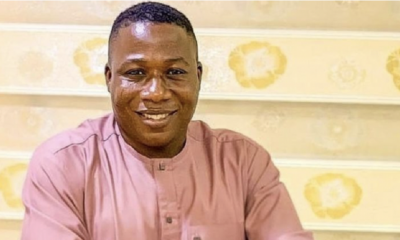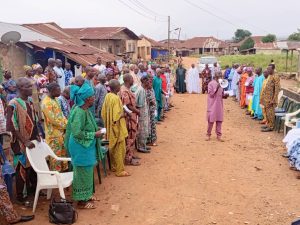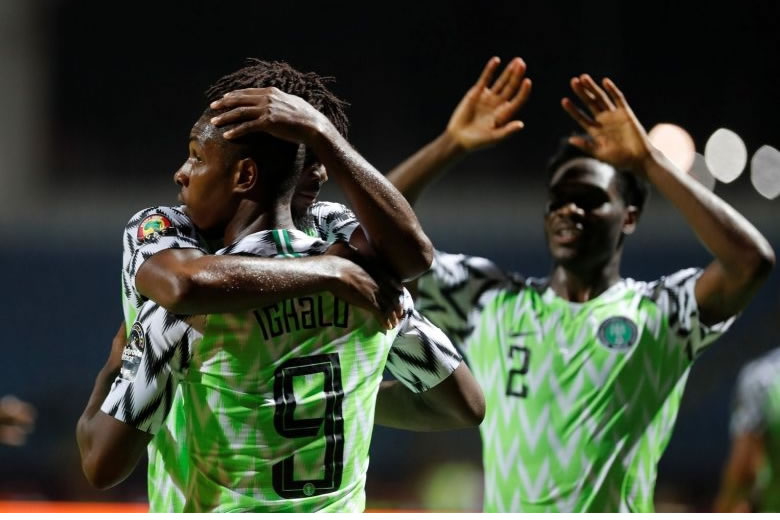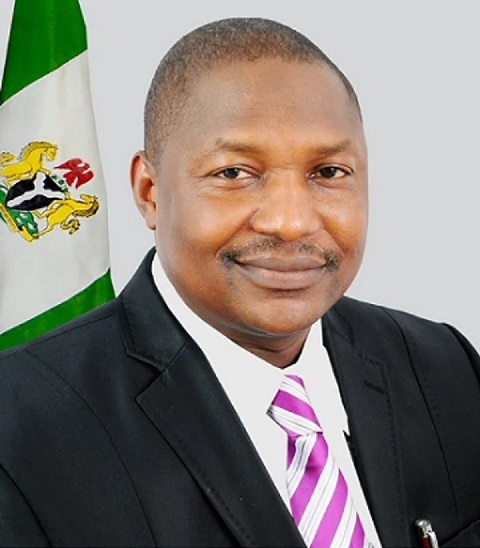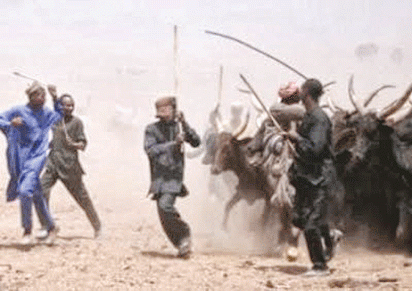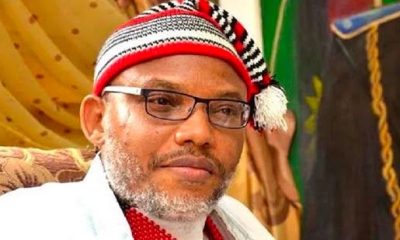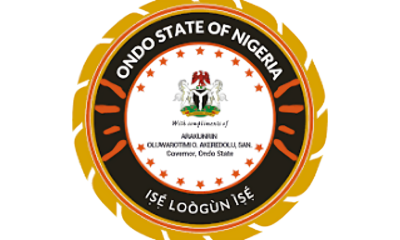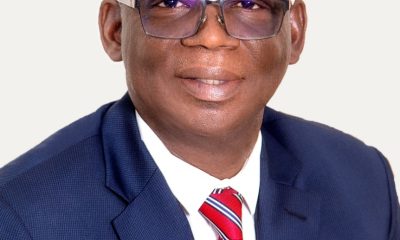OPINION
Sunday Igboho and the Malala Yousafzai Spirit

By Babafemi A. Badejo
I am an admirer of Malala Yousafzai, the young Pashtun girl who was literally shot into fame, allegedly by the Taliban. Since fate got me to write my Ph.D dissertation, submitted to the University of California, Los Angeles (UCLA), on Pakistan, I have always had a soft spot for the country.
I spent about six months of field trip in the country in 1981 and it was a beautiful learning experience.Malala was shot for daring to continue going to school when the Taliban had decreed an end to schooling by the girl-child. The gunman had thought he ended Malala’s life, for it to serve as lesson to others. But the British repaired Malala to the extent that one can hardly notice the damage.
Malala lived to continue her education in Britain and became the youngest recipient of the Nobel Peace Prize, alongside Kailash Satyarthi, in 2014.So much has been written about her and there are many quotes of her’s. I once listened to Malala on audio talking about how her mum rebuked her, as she pressed Malala to cover her face because men were looking at her, and Malala had quipped to the effect that she also wanted to look at the men. Described as the “bravest girl in the world” by Christiane Amanpour in a CNN interview, her response to a question has become a compelling CNN promo: Christiane Amanpour had noted that she still has huge dreams, in spite of being shot, to which she responded: “They only shot a body but they cannot shoot my dreams.”
Sunday Adeyemo, a.k.a Sunday Igboho, was arrested in Cotonou on July 19, ostensibly by security agents acting on the request of Nigeria. Like the stunningly beautiful Yoruba heroine, Moremi, saved Ile-Ife from its tormentors in Yoruba folklore, Sunday Igboho decided to save his people at Igangan from Fulani herders who were being led by a so-called Sarkin Fulani. The reportedly gun-wielding herdsmen had been kidnapping, maiming, raping and collecting ransom, which Sarkin Fulani of Igangan reportedly used to facilitate.
Sunday Igboho organised his people, disarmed the tormentors and put them on the run. The so-called Sarkin Fulani of Igangan confessed in an interview that the name of Sunday Igboho instils fear in him. Like Malala did with the Taliban, Sunday Igboho exposed to his people that there was no reason to be afraid of a bully. Overnight, Sunday Igboho acquired the status of the bravest Yoruba man, even if the Yoruba traditional authorities went quiet, as if nothing happened.
Prior to the disarming of the Sarkin Igangan, Sunday Igboho had been a local agitator for the realisation of an independent Yoruba nation. On October 1, 2020, a rally in support of the self-determination position was avoided by many, including those who were expected to lead it peacefully. But Sunday Igboho showed up and led a small number of people. His extraordinary achievement at Igangan rubbed on some of the so-called Yoruba leaders who, all of a sudden, started to join Professor Banji Akintoye to speak up on Yoruba self-determination.
The voice of Yoruba fat cats who wanted restructuring were being drowned. Even compromise positions like a confederal Nigeria, which I continue to advocate as superior to both the current militarised centralist federation of Nigeria and an independent Oduduwa Republic, was pushed back. The rallies called by the bravest Yoruba man were being attended by many. He drew large crowds that did not provoke disorder. Political, religious and traditional authorities were not enthused, but gradually started to notice the popular warmth towards Sunday Igboho.
Sunday Igboho had been a grass-roots mobiliser for politicians like former Governor Rasheed Ladoja. He lacked finesse. So, he spoke as he saw it. He condemned and even cursed many Yoruba leaders, irrespective of whether they were revered traditional, political or religious authorities. This was costly.
Aside from the Federal Government of Nigeria (FGN), many wanted Sunday Igboho dead. Though he is not a saint, as most of us are not, he definitely was bad for the lucrative business of courting the FGN to keep or acquire access to the steady looting of the national patrimony and other forms of corruption.
It was no surprise that the FGN deployed all sorts of security capacities at the beginning of July to, once and for all, “crush” Sunday Igboho in an overnight attack. The jury is still out on the constitutionality of this attack that violated many aspects of the rule of law. Two of the people reportedly preparing for a peaceful rally in Lagos were killed, as others were arrested and remain in detention. But Sunday Igboho escaped. This escape further boosted the myth around the bravest Yoruba man. He was eventually arrested in Cotonou, Benin Republic on Monday July 19.
It is still not clear if he would be freed to continue his journey or extradited back to Nigeria. Even if he is exiled, extradited, jailed or killed, the solace would be in the quote from Malala Yousafzai. The FGN can only shoot a body or jail a person. They cannot shoot his/her dreams. Moremi had to be captured before returning to save Ile-Ife, the spiritual headquarters of the Yoruba people. Madiba Mandela’s dreams continued to burn beyond his incarceration. The Yoruba sage, Obafemi Awolowo, who was incarcerated till he was released to be Deputy to General Yakubu Gowon, showed leadership.
The need to jettison the 1999 Constitution is clear. Exile, incarceration or killing Igboho can no longer change that. The governors of the South of Nigeria have already caught the bug for change, even if there are differences on what the aftermath should look like. Furthermore, the Yoruba governors are showing more assertiveness over lands that were constitutionally granted to them to hold in public trust in their respective States.
For instance, Yoruba governors threw all caution to the wind and joined other Southern state governors to issue the Asaba declaration on May 11, which has 11 points of concern for the continued corporate existence of Nigeria. Affirming their commitment to a just, fair, equitable one Nigeria in peaceful co-existence, the governors pointed to the incursions of armed herders, criminals and bandits into Southern Nigeria, threatening food security. The meeting resolved that open grazing of cattle should be banned and such ban be implemented across Southern Nigeria by ensuring a stop to the movement of cattle to the South on the hoof, while urging the Federal Government to instead invest in modern livestock management systems. Perhaps very politically crucial were recommendations (v) and (vi) that: “agreed that the progress of the nation requires that urgent and bold steps be taken to restructure the Nigerian Federation leading to the evolution of state police, review of revenue allocation formula in favour of the sub-national governments and creation of other institutions which legitimately advance our commitment to and practice of true federalism; recommended that in view of widespread agitations among our various peoples for greater inclusiveness in existing governance arrangements, the Federal Government should convoke a national dialogue as a matter of urgency…”
The Southern governors rounded up their communique by expressing concern about the degree of insecurity plaguing the nation and called on the president to address the nation in boosting popular confidence.
The Asaba Declaration was very popular in Southern Nigeria. The positive spirit was reiterated at a follow-up meeting of the governors in Lagos on July 5, when a deadline for legislation on the banning of open grazing of cattle should be in place in all the southern states. This position from the follow-up meeting was in spite of the President of Nigeria, the President of the Senate of Nigeria and the Attorney-General of the Federation leading the chorus from Northern Nigeria to denounce the position of the 17 governors from the South.
It is high time that the meeting of the 17 governors from the South of Nigeria be thrown open to embrace other devolutionist governors all over Nigeria, but especially from the North-Central geopolitical zone. The Benue State governor should be readily welcomed into the devolutionist meetings. I would not call them progressive governors because they are not, since none of them is controlling corruption by, for instance, transparently making open how they are spending the security votes allocated to their respective states.
For me, demands for restructuring of the polity must be preceded by the restructuring of Nigerian values away from the current emphasis on materialism at the expense of integrity and character. The issue is not whether a President is from the South of Nigeria in 2023, as the governors from the South of Nigeria demanded at their Lagos meeting. It is to realise a critical mass of National and State Assembly members who are not greedy, in conjunction with a visionary leader who is an epitome of integrity with a great selfless serving spirit. The emphasis being on the people, as opposed to a few friends to be enriched as the national patrimony continues to be looted.
Sunday Igboho’s dream of a just, fair, equitable treatment for his people has already been kindled and it cannot be killed through incarceration or elimination. In fact, the FGN is unwittingly making Sunday Igboho a martyr when he should not have been one, among a sophisticated and highly educated people. But since the Yoruba lack selfless visionary leaders, there is room for an activist like Sunday Igboho.
Should Sunday Igboho be released by the Republic of Benin authorities, he should thank his stars that he would only be in exile. And if he is extradited and jailed but not killed, he would need to be strong and accept that only a few Yoruba leaders will speak up and stand by him. The sizable Yoruba diaspora would help Sunday Igboho’s heroic leadership. He should expect that his millions of supporters at home would be relatively unorganised and actively disorganised by the greedy and bad Yoruba leaders of whatever category. But the tide is already turning.
Babafemi A. Badejo, a former Deputy Special Representative of the UN Secretary-General for Somalia is currently a Professor of Political Science and International Relations at Chrisland University, Abeokuta, Nigeria.
OPINION
This Trial of Oloyede
By Tunde Akanni
It’s been traumatic for my entire family since that video started making the rounds. I sneaked a slight view… It’s our trial. It’s my trial. Oloyede is genuine. He is most sincere. He is modestly so, as well. For us, however, Allah knows best.
I was with a trader in the afternoon of what I considered a dark Wednesday, the 14th of May. “Se bi won ni JAMB o get mo bayi…”. I had to cut in immediately. Which JAMB? “Madam, that’s one person I will vouch, and vouch for…zero tolerance for corruption. Absolutely responsible with a high level of consciousness for the good of others. If certain things went wrong at JAMB, I agree it’s his responsibility to carry all pleasant and other burdens but just know that the bad side of the operations may as well be sabotage. I have absolute trust in that man. Ask my own colleagues about me, but Oloyede is my own hero, somebody I have known for more than 40 years…”This is by no means a reductionist disposition to the tragedy induced by the so-called computer glitch. May the Almighty God in His infinite mercy console the parents of the candidate reported to have committed suicide. May God strengthen them to survive this gloomy phase of their lives and sustain them to reap bountiful compensation that will endure in their lives. It’s hard, so hard to pull tragedies of this magnitude. I personally feel for these parents.The said computer glitch, may we never fall victim to it. Those who work for big organisations requiring a large layout of ICT operations know what I’m talking about. Rather than being ‘solutional’, IT facilities can be unimaginably problematic sometimes, yet indispensable in this civilisational dispensation. This is not doubting deliberate sabotage, as may have happened in the case of JAMB. I’ve been part of Oloyede’s JAMB journey to attest to his commitment to offer his best for the otherwise sinking board.Far from being cosmetically exhibitionist, the Oloyede-led JAMB team, led by the Education minister, Tunji Alausa, went round the critical facilities of JAMB during the just concluded examination. Alausa saw, firsthand, like never before elsewhere in this country, how far JAMB had gone in its strive for transparency and the real-time monitoring of the conduct of examinations nationwide. Alausa, beyond being in awe, sought to make the JAMB effect spread immediately to other examination bodies.No be dem say, same day, the WAEC team came to JAMB and made it into the situation room, which was my own duty post. The NECO team followed suit afterwards, both duly led around by the sturdy lead IT consultant who’s been reliably there from Oloyede’s assumption of duty, Damilola Bamiro. Far richer, given that they charge more for their exams, the duo of WAEC and NECO were suddenly mandated to understudy the examination sector leader in Africa that JAMB has become over time.The staff of both WAEC and NECO suddenly had to undertake a professional excursion led through all the real time monitoring screens and other digital facilities. It was obvious they marvelled at what they saw, revealing a functional leader-subordinate synergy manifest with trendy output that the world can see and learn from.But that may even seem like the tip of the iceberg of the output of the hard work and commitment of the nation’s foremost icon of integrity in public service. A series of far more seemingly serious strides had been accomplished by Oloyede at JAMB. As a focused scholar, he keeps ensuring that every bit of the experience of the Board is treasured as worthy data to guide future actions and even subjects for further research.Not even the agencies dedicated to emergency matters in Nigeria could have been as prompt as the Oloyede management on this ugly glitch saga. Once the complainants began ventilating into the public space, JAMB rose to the challenge without any predictably traditional arrogant stance of government is always right. I was aware that a particularly strident public critic and a former students’ leader at Obafemi Awolowo University, Adeola Soetan commended the spokesperson for JAMB for the excellent handling of public complaints.Promptly, an independent team of investigators was set up to unravel the mystery leading to the rather depressing situation that now confronts us. The team, drawn from assorted but technically relevant constituencies, has found out that no fewer than 165 centres of over 800 examination centres nationwide were affected.Obviously well prepared for whatever the outcome may turn out to be, he braced up to the challenge to embrace the surrender value to tell it to the world as it is. This trial is for all of us who believe and trust Oloyede. I am in this group. So much so that his public cry infected me…It was a patriot’s cry for his beloved country. Like me, a former Law don at LASU, Dr Kilani wasn’t any less affected as demonstrated in a quick note to me: “I write to associate myself with the pain, sorrow and emotion of our own Professor Oloyede. I could not hold my tears seeing him cry. May Almighty Allah see him through. May we all not be put to shame…”But then came a soothing message from Gbade Osunsoko, my cousin: “…He will come out of this much stronger because Nigerians will trust him far better than a number of our leaders.. A man that makes mistakes happens under him and takes responsibility – it’s a big deal in Nigeria.”With Oloyede, young Nigerians with challenges regarding sight are no longer left to moan their fate endlessly, with adequate provision for their inclusion in the UTME. How many of our public facilities are this inclusion conscious as stipulated by SDGs? How come a legacy built through almost a decade at the very best cost ever possible will be made to crumble when the game changer leader remains ever modest? JAMB has steadily risen through thick and thin to accomplish its tasks to the admiration of stakeholders, nationally and internationally, under Oloyede. Both NNPC and the Nigeria Police, being beneficiaries, can attest to the current competence of JAMB. How many other numerous stakeholders nationwide never deemed to have any relevance to JAMB before Oloyede but have since become critical, if not indispensable players?But why does this sudden saddening encounter threaten our joy of service without blemish? Why this unforeseen truncation of a good story, so intentional, coming from Africa? Whodunnit? Surely the truth shall come out for the world to perceive and assess and get to appreciate the efforts and the quantum of commitment appropriated to the JAMB excellence project driven by Oloyede.One cannot but be deeply concerned. Before the very eyes of a few of us carefully selected to give support from our respective professional perspectives from the very beginning, Professor Oloyede’s concern for genuine growth and development was real. It is still real and increasingly so, as a matter of fact. Indeed, inimitable. It shall be well.Tunde Akanni is a professor of Journalism and Development Communications at the Lagos State University, LASU. Follow him on X:@AkintundeAkanniOPINION
Democracy, Institutions, and the Rule of Law

By Kator Ifyalem
Democracy, often hailed as the cornerstone of modern governance, is a system that empowers citizens to participate in the decision-making processes that shape their lives. However, the mere existence of elections is not enough to ensure a fair, just, and prosperous society.
Without robust institutions, the rule of law, and ingrained values, democracy can become a hollow shell, susceptible to corruption, manipulation, and eventual collapse. At its core, democracy is built on the principle that power resides with the people. This power is exercised through fair elections, where citizens choose representatives to govern on their behalf. The effectiveness of this system relies heavily on the strength of supporting institutions, adherence to the rule of law, and shared values that guide societal behaviour.Institutions serve as the backbone of a democratic society, translating the will of the people into action. These include governmental bodies such as the legislature, executive, and judiciary, as well as independent organizations like electoral commissions, anti-corruption agencies, and human rights commissions. These institutions provide checks and balances, ensuring that no single entity or individual can accumulate too much power. They create a framework for accountability, transparency, and effective governance.An independent judiciary is crucial for upholding the constitution and protecting individual rights. Without it, laws can be manipulated or ignored by those in power, leading to tyranny. Similarly, a free and independent media acts as a watchdog, informing citizens and holding those in power accountable. When media institutions are weakened or controlled by vested interests, the flow of information is compromised, and citizens are unable to make informed decisions.The rule of law is another critical component of a functioning democracy. It ensures that all citizens, regardless of their status or position, are subject to the same laws and legal processes. This principle is fundamental to creating a fair and just society where everyone’s rights are protected. A robust legal framework, consistently and fairly enforced, provides the predictability and security necessary for social and economic development. It protects property rights, enforces contracts, and creates an environment conducive to investment and growth.Moreover, the rule of law is essential for protecting minority rights and preventing the tyranny of the majority. In a true democracy, the rights of all citizens must be respected, even if they are not part of the ruling majority. This protection is enshrined in laws and enforced through effective legal institutions.Values form the third pillar of an effective democracy. These shared beliefs and principles guide societal behaviour and inform policy-making. Democratic values include respect for human rights, tolerance of diversity, commitment to justice, and belief in the equality of all citizens. When these values are deeply ingrained, they act as a safeguard against authoritarian tendencies and help preserve the integrity of democratic institutions.For instance, a healthy democracy can be likened to a three-legged stool, where institutions, the rule of law, and democratic values form the legs. Just as a stool cannot stand stably without all three legs being strong and balanced, a democracy cannot function effectively if any of these elements is weak or missing. In Nigeria’s case, we’ve seen how weaknesses in one area, such as institutional challenges in election management, can put stress on the other legs, requiring the judiciary (rule of law) and civil society (democratic values) to bear more weight to maintain stability.Education plays a crucial role in instilling these values. A well-informed citizenry, aware of their rights and responsibilities, is better equipped to participate meaningfully in the democratic process. Civic education programs that teach the principles of democracy, the importance of institutions, and the value of the rule of law are essential for creating engaged and responsible citizens.The interplay between institutions, the rule of law, and values creates a self-reinforcing cycle that strengthens democracy. However, this cycle can also work in reverse. Weak institutions often lead to a breakdown in the rule of law, eroding democratic values and further weakening the system. This negative spiral will ultimately lead to the collapse of governance, even if the outward trappings of democracy remain.To prevent this decline, concerted effort is required on multiple fronts. Institutional capacity must be built and maintained through adequate funding, training, and support. The rule of law must be consistently enforced, with mechanisms in place to address corruption and abuse of power. This requires not only strong legal frameworks but also a commitment to their implementation.International cooperation also plays a role in strengthening democracy. Countries learn from each other’s experiences, share best practices, and provide support for development. However, it’s crucial to recognize that democracy cannot be imposed from outside; it must be nurtured from within.True democracy requires more than just the act of voting; it demands a comprehensive system of governance that respects the rights of all citizens, upholds justice, and promotes the common good. Strengthening these fundamental pillars (institutions, the rule of law, and values), is crucial in building more resilient, effective, and truly representative democracies that serve the needs of all citizens and contribute to global stability and prosperity. Where does Nigeria as a nation stand on this scale?OPINION
Reshaping Nigeria’s Student Loans for Inclusive Access

By Tosin Kolade
In June 2023, President Bola Tinubu signed the Student Loan (Access to Higher Education) Act into law, marking an important step forward in the country’s approach to financing tertiary education.The initiative was designed to provide interest-free loans to students in higher institutions, thereby expanding access to education for financially disadvantaged youth.
However, nearly two years on, the scheme’s implementation remains burdened by challenges, prompting growing concern and debate among stakeholders. In response to criticism of the original law, the Federal Government repealed and re-enacted the Act in April 2024.The revised legislation established the Nigerian Education Loan Fund (NELFUND) as a corporate entity responsible for managing and disbursing the loans.Notably, the amended version eliminated restrictive eligibility criteria such as income thresholds and guarantor requirements.It also extended the scheme’s coverage to include students enrolled in government-accredited vocational training centres.To streamline access, the application process was simplified, requiring only a valid National Identification Number (NIN) and Bank Verification Number (BVN).Hence, all submissions were made via the NELFUND portal.In spite of these improvements, the scheme has continued to attract criticism.One of its most vocal opponents is the Academic Staff Union of Universities (ASUU).In a recent interview with a national daily, Dr Mwolwus Jurbe, Chairman of ASUU’s University of Jos chapter, outlined the initiative as “fundamentally flawed”.He argued that the scheme was unlikely to benefit its target groups, especially students from low-income families.“The scheme is pushing education out of the reach of the common man,” he said.Jurbe said that, amid high unemployment rates and soaring tuition fees, expecting repayments from indigent students was unrealistic.ASUU also raised alarms over reports that TETFund allocations might be redirected to fund NELFUND.The body warned that dismantling a functional funding mechanism in favour of an untested alternative could jeopardise the future of tertiary education in Nigeria.Meanwhile, the National Association of Nigerian Students (NANS), while generally supportive, has also expressed reservations.The association acknowledged the potential of the scheme to reduce dropout rates, but emphasised that the absence of scholarships or grants rendered it incomplete.NANS President, Comrade Olushola Ladoja, condemned the alleged mismanagement of NELFUND, calling for the dismissal of implicated officials and the publication of the 51 tertiary institutions reportedly involved.“Any vice-chancellor, rector or provost found culpable in the mismanagement of student loans must be removed from office.“Their actions sabotage the Federal Government’s effort to make education accessible to all,’’ Ladoja said.He urged Tinubu to probe the reported diversion of N71.2 billion and criticised NELFUND for excluding the national student leadership from key stakeholder engagements.Additionally, NANS called on the EFCC and ICPC to investigate the matter and advocated for a five-year post-NYSC loan repayment grace period, citing the employment difficulties faced by many recent graduates.Civil society groups have also raised concerns.The Education Rights Campaign (ERC) described the initiative as “badly thought-out, ill-conceived and fundamentally unworkable”.Hassan Soweto, National Coordinator of the ERC, lamented repeated delays in the loan rollout, calling it evidence of poor planning and political inertia.“It is a national embarrassment that almost a year after the law was signed, students are still waiting for funds,” he said.Worthy on note, trust in the scheme further eroded in August 2024 when it was revealed that no tertiary institution in the South-East had been included in the first phase of disbursements.Reacting, the Concerned Igbo Stakeholders Forum (CISF), led by Chukwuma Okenwa, condemned the omission as a deliberate act of marginalisation.Okenwa argued that excluding an entire geopolitical zone from a national programme violated the federal character principle.Although NELFUND claimed South-East schools had failed to respond to verification notices, the CISF rejected this explanation, insisting that at least one compliant institution should have been selected.Similarly, the Corporate Accountability and Public Participation Africa (CAPPA) expressed concern over NELFUND’s plan to limit eligibility to students in “high-demand” disciplines.Zikora Ibeh, CAPPA’s Senior Programme Manager, warned that the policy could marginalise students in the humanities, arts, and social sciences.“This approach risks deepening inequality by denying support to students whose fields may not be seen as immediately profitable but are crucial to national development,” she said.Also, controversy followed the announcement that the EFCC had donated N50 billion in recovered funds to the loan scheme.A Legal expert, Nnaemeka Ejiofor, cautioned that while well-intentioned, the EFCC lacked constitutional authority to reallocate recovered public funds without National Assembly approval.“Such actions, no matter how well-meaning, set a dangerous precedent,” he warned.Meanwhile, fee hikes across federal and state universities have exacerbated the financial burden on students and their families.In some cases, tuition fees have surged by as much as 1,000 per cent.A University of Lagos student, Michelle Njemanze, shared that her tuition rose from N16,000 to N196,000 in a single academic session.For many, the student loan scheme remains a promise yet to be fulfilled.Although the Tinubu administration allocated N200 billion to the scheme in the 2024 budget and appointed banking executive Jim Ovia as chairman of the NELFUND board, disbursement delays continued well into May 2025.In response to growing dissatisfaction, NELFUND recently announced a major overhaul of its application system.NELFUND Chief Executive Officer, Mr Akintunde Sawyerr, recently revealed that the agency was deploying a fully digitised, user-friendly platform to streamline the loan process and eliminate bureaucratic delays.“Education is a right, not a privilege; with this technology-driven model, we are establishing a transparent and efficient system that puts students first,” he said.Sawyerr added that the reforms aligned with Tinubu’s Renewed Hope Agenda, which prioritised educational access and youth empowerment.According to him, more than 320,000 students had already benefited from the scheme, with thousands more undergoing verification as operations scale-up.Looking ahead, NELFUND also plans to integrate its systems with institutional portals across the country.This collaboration aims to enable seamless data exchange, automate student record verification, and speed up loan processing.While recent reforms are encouraging, experts insist that sustained political will, transparency, and inclusive policies are essential to realise the full potential of Nigeria’s student loan scheme.They agree that, in theory, the loan scheme offers a vital opportunity to democratise access to higher education in Nigeria.In practice, however, its rollout has been hindered by legal ambiguities, implementation delays, and regional inequities.If these challenges remain unresolved, experts warn, the scheme may end up widening the very educational gap it was intended to close. (NAN)


